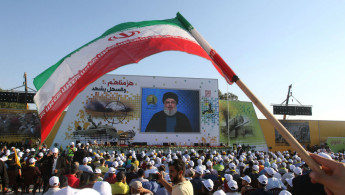Hizballah says Iran protests will 'leave Trump disappointed'
Protests began last Thursday in the northeastern city of Mashhad, with anti-government rallies quickly spreading to other cities including Tehran, Khorramabad, Karaj and Sabzevar.
Thousands are thought to have taken part in the protests, making them the biggest show of public defiance since 2009, when Iranians - as part of the newly-formed Green Movement - took to the streets to denounce alleged rigged presidential elections.
"There is nothing to worry about and what happened in Iran is well contained," Hassan Nasrallah said in an interview to Al-Mayadeen, a TV channel close to his movement.
Iran's Revolutionary Guards chief proclaimed the "end of the sedition" on Wednesday as tens of thousands of people rallied in a show of solidarity with the regime.
Trump, who has repeatedly criticised Tehran since the latest protests began, praised the anti-government demonstrators for acting against the "brutal and corrupt" regime and said Iranians had "little food, big inflation and no human rights".
Iran's foreign ministry fired back that the US leader was "wasting his time sending useless and insulting tweets" and advised him to pay more attention to "domestic issues" in his homeland.
"Trump's hopes have been disappointed," Nasrallah said, as will the hopes of "all those who bet that the protests would grow and lead to the fall of the regime and chaos in Iran."
He said he saw no risk of a change in Tehran's policy of support for movements such as his but when asked about Iran's financial contributions to Hizballah, he replied "no comment".
In an attempt to shut down protests and manage the unrest, Iran's government blocked access to the encrypted Telegram messaging app and the photo-sharing app Instagram, which now join Facebook and Twitter in being banned.





 Follow the Middle East's top stories in English at The New Arab on Google News
Follow the Middle East's top stories in English at The New Arab on Google News
![Israeli forces ordered bombed Gaza's Jabalia, ordering residents to leave [Getty]](/sites/default/files/styles/image_330x185/public/2176418030.jpeg?h=a5f2f23a&itok=_YGZaP1z)

